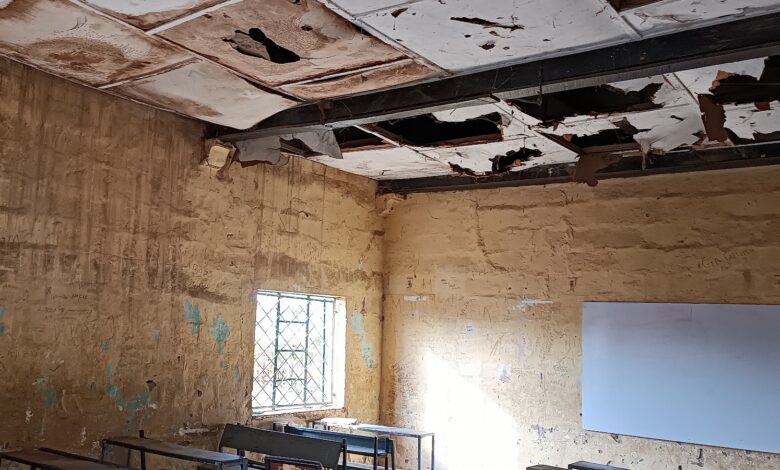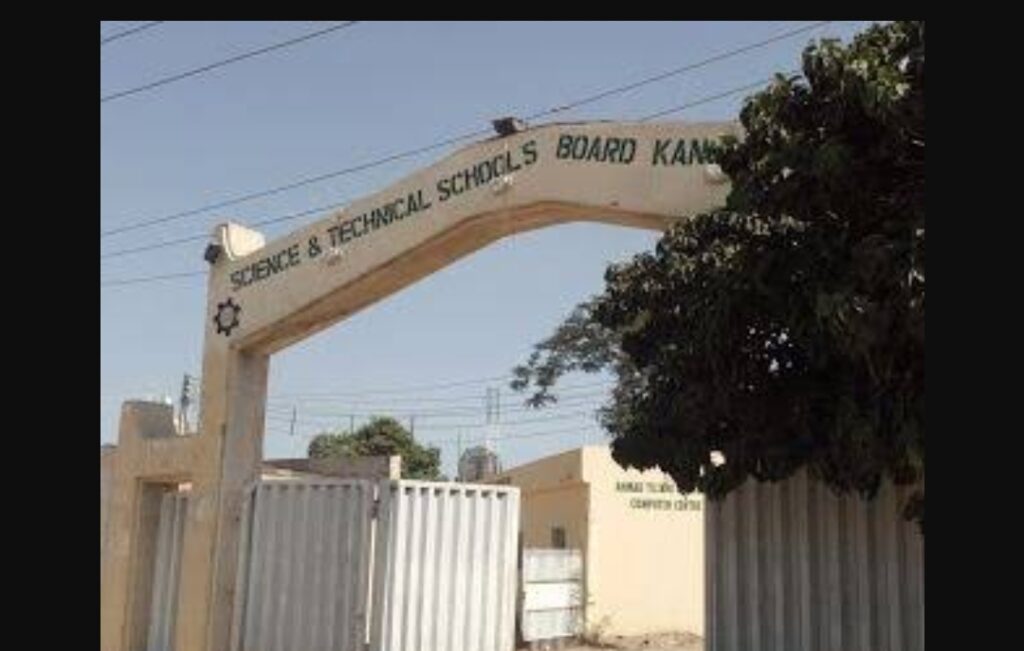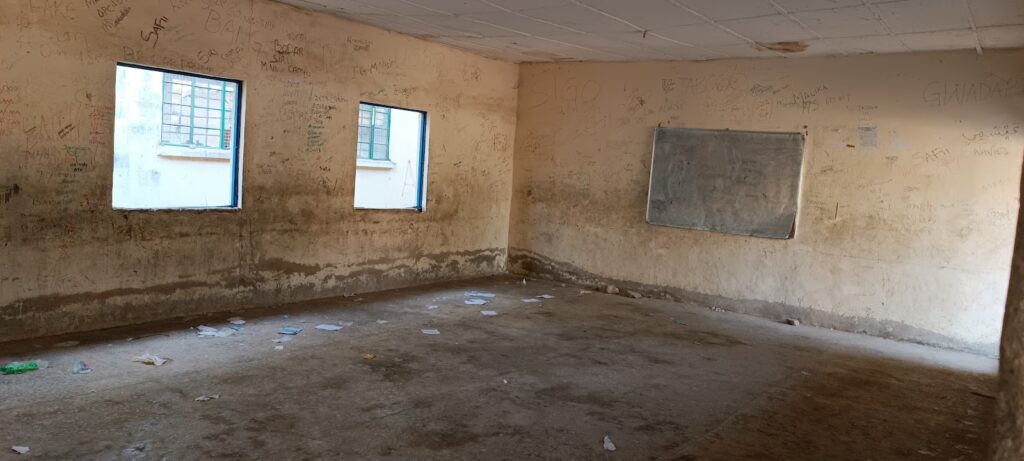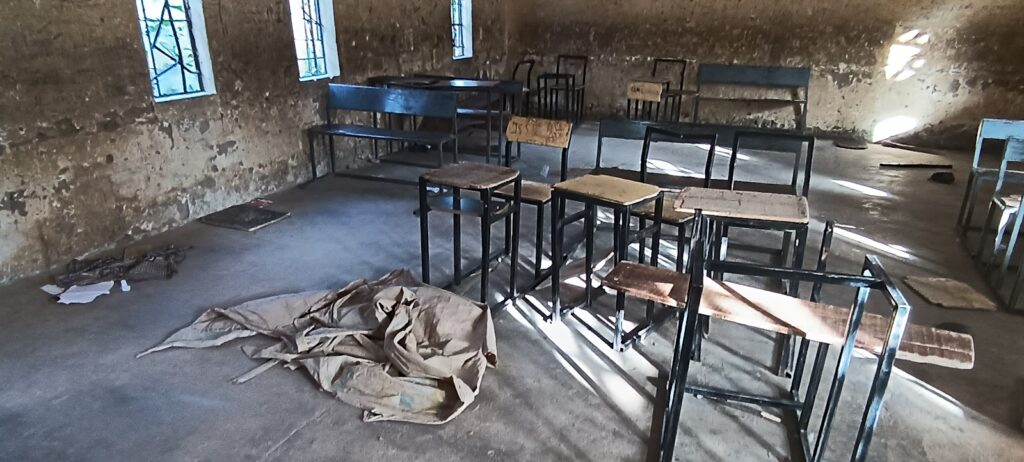The Cost Of ‘Free’: Pathetic Condition Of Kano Technical College
Once a beacon of learning and innovation that produced prominent engineers and public figures, the school has fallen into disrepair and neglect.

At around 5:00 p.m., when all of the students had gone home, Muhammad* emerged from a classroom carrying a physics textbook and wearing a blue overall that indicated he was a technical school student. His zeal to learn and need for knowledge that might advance his hope of becoming an electrical engineer could be clearly seen on his face. But there was something worrying him.
His classroom was a chaotic mess, showing all signs of neglect, a sorry sight to behold for any concerned. Names and mathematical equations had been written in graffiti on the peeling, discoloured walls. The broken ceiling added to the chaos, with pieces of plaster and debris raining down on the floor.
The class was intended for 40 students, he said, but more than 200 from three different schools are crammed onto the few desks, making it feel cramped. Around 100 others sit on the bare floor, some sitting on their shoes, others on a large sack that has been converted into a mat like in traditional Almajiri schools.

Despite the fact that many of the state’s secondary schools are experiencing the same infrastructural decay, Muhammad had hoped that his school would be an exception. “It’s a special school that was attended by the best engineers and prominent politicians from the state,” he said. “It’s the dream of many young students in Kano.”
He was correct; many well-known politicians, such as the former governor Engr. Rabi’u Kwankwaso and the former deputy governor Engr. Abdullahi Gwarzo, attended the school. However, the standing of former students has not saved it from deteriorating facilities, overcrowded classrooms, and low staff morale. These are causing the institution to lose its former stature.
Government Technical College (GTC) Kano, Northwest Nigeria, was established in 1953 by the British colonial government as the day division of the three technical institutions in Kano State. Their purpose was to prepare students for careers in trade and vocational education. The college is less than a kilometre from the state government house on the State Road in Nassarawa Local Government Area.
In 1982, the Kano State House of Assembly added the three Technical Colleges to the list of special science schools under the Science and Technical Schools Board (STSB) in recognition of the value they offer to the improvement of Kano’s educational system, notably in the fields of technology and engineering. Other technical colleges that started from inception are GTC Wudil and GTC Bagauda.
According to the STSB website, the schools were founded “with the sole aim of producing qualified secondary school students for admission into tertiary institutions to pursue related science and engineering courses.” For many years, they have been regarded as some of the top secondary schools in Kano, succeeding in their mission to produce the best engineers and doctors.
However, the future of these schools is now in jeopardy. GTC Kano has been neglected for years, and the education programme under the administration of Kano state governor Dr Abdullahi Umar Ganduje has not done much to improve its condition.
Despite budgeting substantial funding for them — ₦3 billion approved in 2021 — these schools are in a terrible state. According to the staff of STSB who spoke to HumAngle, preferring anonymity, this is “having a negative impact on the children and teachers who are compelled to work there with little resources.”
Through interviews with educators, including administrators, teachers, and students, we have unearthed a troubling picture of a complex issue.
Free but abandoned
A sizable billboard promoting free education in Kano hung close to the entrance of Gidan Murtala, a story building hosting the Kano state ministry of education. It featured a photograph of students from science and technical schools during an experiment in the school’s lab.

The schools chosen for the campaign were carefully considered. Many Kano indigenes aspire to attend science and technical colleges, and what could entice them more than having their dream realised for free? However, a member of the STSB staff claimed that this was the root of the entire problem.
In Kano State, “free education is a gigantic political swindle,” he said to HumAngle. It is only intended to convey to outsiders that the state offers free education, despite the fact that doing so comes at a higher cost of neglect and having little money to maintain the schools, the man added.
In order to ensure that all children of school-going age, regardless of their backgrounds, have access to basic education, the Kano state administration reinstated free and compulsory education in 2019. However, this denied the Kano school administrators the ability to generate money for specific school initiatives through fees.
The initiative, which includes all of Kano’s schools, has drawn criticism from many just a year after its start since it has become evident that the state government is unable to meet their needs. Although it is not unusual to see students in Kano secondary schools under the Kano Senior Secondary Schools Management Board (KSSSMB) sitting on the ground with no desks in classes, nobody thought that the STSB schools would be among the worst affected due to their history of excelling even under a hostile condition.
According to reports, the advent of free education left many schools, including those under State Universal Basic Education Board (SUBEB), KSSSMB, and STSB, impoverished, resulting in a lack of necessary supplies, including desks and other educational tools. The pupils are consequently battling to keep up with their coursework and are in danger of falling behind.
The member of staff who spoke to HumAngle said that the STSB itself is facing numerous problems, most notably not receiving adequate upkeep funding to operate its schools. Supervisors supposed to be overseeing the schools cannot easily travel between the institutions they administer. “There isn’t enough money to fuel cars for supervision, cars break down, and there isn’t money to fix them or replace them. Sometimes, even feeding students attending boarding schools becomes a major issue,” he said.

The situation has gotten so bad at the board’s headquarters, the official said, that none of the printers in the nine departments of the STSB is working. “We work on our phones, occasionally sending reports over WhatsApp.” He complained that whereas the schools’ board itself had over 10 automobiles and each STSB school had at least three cars, today’s STSB has just two and no funding for fuel purchases.
The employees sometimes have to fuel the cars themselves to conduct supervision in schools within the city, “but those in villages take one to two years without supervision, making both the students and teachers relaxed knowing there is no one to physically supervise them.”
A senior STSB employee who recently retired after stints as a teacher and principal said in his 35 years of employment at several science and technical schools, he had never witnessed a situation as bad as the last four years.
He explained, “You know STSB schools were among the best in the entire Kano State but it was only possible because they had enough funding and they were regarded as financially autonomous.”
“But recently, since the free education programme was implemented in 2019, everything changed, with the Ministry of Education seizing control of everything without any prior knowledge of how these institutions are run,” he continued.
According to him, this led to the budget not receiving approval and not getting the money even if approved, leaving the building in disrepair and without instructional resources. “It got to the point where staff members were given the opportunity to become principals but refused the position due to the fear that they might not run it well and would later be accused of destroying the school,” he said.
GTC Kano example
Aminu Usman, a student in NTC 3 (senior year three) at the Radio, Television and Electronics (RTV) department, stated that no seats are available for any classes in junior 1 and NTC 1. The students of the remaining classes either bring their own prayer mats or sit on the ground. While confirming that teachers still attend classes, he admitted it is hard to control the students in large numbers, especially during classes that require enough desks, such as Technical Drawing.

For trade practicals, Usman said he purchases his own tools for experiments and academic assignments. “They are not expensive,” he said, “so they are not a big deal.” The Chemistry and Physics practicals, where he only took one experiment due to a lack of chemicals or apparatus, are his major concern.
However, Usman recalled that during a visit to the GTC Kano by the Commissioner of Education, Mallam Muhammad Kiru, who he said was once the head of physics department in the school, promised to support bring in missing apparatus that would make learning easier.
Not all departments have cheap, practical materials like RTV. The departments that are worst hit are those in which big machinery is required for practicals, such as the Mechanical and Motor Vehicle departments.

The frustration of working without tools or equipment affects both teachers and students. Mallam Muhammad Abba, a former technical school student, explained that “a technical school with no equipment is an unpleasant and restrictive place to learn and work.”
“It is challenging for students to gain practical experience and completely comprehend the concepts they are being taught without access to the required tools and equipment. This may result in a lack of expertise and confidence in their chosen subject, which could have detrimental effects on their future professional lives,” Abba explained.
“Just picture a mechanic working on a vehicle without access to a lift or the right diagnostic equipment. Or a cook attempting to prepare food without access to a stove or oven. Without proper, students may find it difficult to realise their full potential and to completely engage in the learning process.”
More schools, more problems
It was the administration of Dr Rabiu Kwankwaso, a previous governor of Kano, that expanded technical institutions to all 44 local government areas in the state in 2013. His government said that this was done to allow the youth who want to enrol in technical education access to the schools.
Nevertheless, despite the money spent on building those schools and the admission of thousands of pupils, not enough funding was available to support their operation. Aside from the shortage of basic tools and equipment, which made it impossible to teach various trade courses, the STSB employee who spoke to HumAngle said that funding for the schools had been reduced.
He explained that instead of the schools receiving at least one million Naira for vehicle upkeep and other minor operating expenses, the money was reduced to only ₦200,000. “And the way things are now, schools go two to three months without receiving a dime,” he continued.
As a result, extracurricular activities were discontinued. Even some practicals are not completed, along with the inter-school quizzes and debates that define the schools and contribute to student morale, leading to them working harder.
Because NABTEB has refused to accredit the new technical colleges for final year exams, when students reach their final year, STSB must combine at least three schools into one, which makes it difficult for one teacher to handle the packed classes of students numbering between 80 to 200 according to their departments.
According to a former principal of one of the colleges, “This is different from some schools that were closed under the premise of insecurity in villages but which, in truth, is about the inability to pay the operational cost of the schools.” To create two distinct schools in one location, schools like GTC Tiga and GTC Bagauda were amalgamated with GTC Warawa and GTC Ungoggo.
Schools left to the mercy of former students
Pictures of the dilapidated dormitory and classes of Science College Dawakin Kudu, one of the STSB schools attended by the current deputy governor of Kano state and the APC candidate for governor in Kano, went viral on social media a year ago.
Afterwards, the association of old students repaired the run-down dorms and students continued to reap the benefits of a potent old boys’ association. Not all colleges, though, have such a robust alumni organisation. The majority of them are still battling infrastructural gaps.
The support from the alumni isn’t also enough to meet the schools’ demands. At GTC Kano, for example, new classrooms were built. But without furniture, students are still forced to sit on the bare floor as they receive lectures.
_________
*Names have either been changed or not mentioned to protect interviewees who are still students or work for the government.
This report is part of a collaborative investigative series by HumAngle, the International Centre for Investigative Reporting (ICIR), NPO Reports and TheCable, facilitated by the Wole Soyinka Centre for Investigative Journalism (WSCIJ) under its Collaborative Media Engagement for Development, Inclusivity and Accountability (CMEDIA) project, with support from the John D. and Catherine T. MacArthur Foundation.
Support Our Journalism
There are millions of ordinary people affected by conflict in Africa whose stories are missing in the mainstream media. HumAngle is determined to tell those challenging and under-reported stories, hoping that the people impacted by these conflicts will find the safety and security they deserve.
To ensure that we continue to provide public service coverage, we have a small favour to ask you. We want you to be part of our journalistic endeavour by contributing a token to us.
Your donation will further promote a robust, free, and independent media.
Donate HereStay Closer To The Stories That Matter




